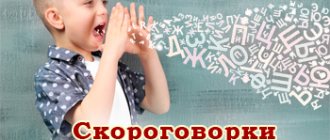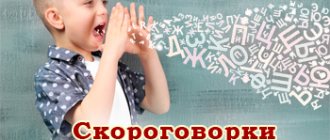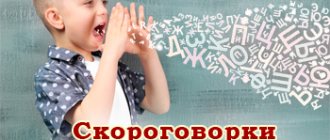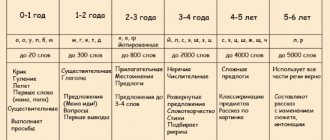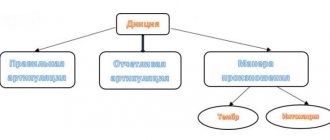Greetings, my dears! Today we will learn to speak beautifully and correctly. And for this we will resort to the help of tongue twisters for the development of speech and diction.
As you know, no one likes lisping and incomprehensible speech. It greatly spoils the impression of a person, especially if he is an adult and not a child. Therefore, it’s time to take care of yourself and your language. Tongue twisters are the fastest and most inexpensive way to improve the quality of your speech.
They will teach you not only to pronounce difficult sounds, but also to feel them. Moreover, to achieve a good speech therapy effect, it is enough to practice 10-20 minutes a day. First, read the tongue twister slowly, then with each reading try to increase the speed of its pronunciation. Don’t doubt, everything will work out for you!
Tongue twisters for the sound [R]
In the forest, the beaver and the beaver's brother work without an axe. During a thunderstorm, the body collapsed from the load of watermelons. There are tomatoes in Fedora's garden. Behind Fedora's fence are fly agaric mushrooms. Millet flies into Frosya's field, Frosya takes out the weeds. Makar gave Roman a caramel, and Roman gave Makar a pencil. They gave the little one corn, and the little one asks for a watermelon. The sparrows are waiting at the feeder for food, Markushka is bringing them cloudberries in her pocket. Behind the cockroach with a drum, behind the mosquito with an axe. The queen's gentlemen sailed to her on a caravel. Charles stole half a crucian carp and half a carp from Polycarp. The wise raven quickly picked fly agaric mushrooms from the ditch. A crab crept onto the ship, crucian carp stole the gangplank. One swarm of mosquitoes is behind the mountain, and the second swarm is under the mountain. Open the gates, Uvar, we are carrying loads of wood. The path is trodden along the grass. Tongue twisters jump like crucian carp in a frying pan. Early in the morning two rams drum on drums. Roma Masha picked daisies. The pig dug and dug, dug half a snout. From the mountain - not uphill, uphill - not from the mountain. The pig was stupid, dug up the whole yard, dug half a snout, but didn’t get to the hole. The gray rams beat the drums, beat them indiscriminately - they broke their foreheads. Timoshka Troshke crumbles crumbs into okroshka. Three trumpeters blow their trumpets. The nimble mink darted into the hole.
Content
- How to work with tongue twisters Work order
- Pronunciation speed
- Pronunciation intonation
- Complex tongue twisters for adults
It's no secret that tongue twisters are used to train diction and pronunciation. This is the fastest and easiest way to improve the quality of your speech. If you systematically devote time to speaking tongue twisters, you can achieve good results. Speakers, actors, vocalists, and public speakers practice tongue twisters regularly. In general, devoting time to special exercises is useful for everyone who wants to achieve intelligible and expressive speech.
Tongue twisters for the sound [R and L]
I was at Frol’s, I lied to Frol about Lavra, I’ll go to Lavra, I lie to Lavra about Frol. There are three crucian carp and three carp in Polycarp's pond. All beavers are kind to their beavers. Karl stole corals from Clara, Clara stole a clarinet from Karl. Valya's Clara is playing the piano. The Queen gave the gentleman a caravel. The quail flew before the quail, before the quails. On Mount Ararat Varvara was picking grapes. Eagle on the mountain, feather on the eagle. The fellow ate thirty-three pies, all with cottage cheese. Thirty-three ships tacked, tacked, tacked, but did not tack. The crow missed the crow. Get up, Arkhip, the rooster is hoarse. By the pond in the grass in the darkness, crayfish rustle in a noisy fight. There is grass in the yard, there is firewood on the grass, don’t cut wood on the grass in the yard! The baker baked the bagel, bagel, loaf and loaf from the dough early in the morning. Watermelons were being reloaded from truck to truck. During a thunderstorm, the body fell apart in the mud from a load of watermelons. The crab sold the rake to the crab. Sold the rake to the crab crab. Rake the hay, crab! In the field of the pole-pole field, the flight of the pole-pole field. There will be no weeds in the field if the field is flying. The ship was carrying caramel, the ship ran aground, and the sailors ate caramel aground for three weeks. Either Borya bought a roll of roofing felt for Tolya, or Tolya bought a roll of roofing felt for Borya. Margarita collected daisies on the mountain, Margarita lost the daisies in the yard. We bought a lace dress for the cuttlefish... the cuttlefish walks around, showing off the dress. As if on a hill, thirty-three Egorkas stand on a hillock.
Improving diction in children
The main difficulty for children when pronouncing complex words is the rapid change of articulatory position, when it is difficult to rebuild the speech apparatus depending on the subsequent changing sound. Before you start working with your child directly on diction, you need to conduct speech gymnastics aimed at improving articulation.
Carry out exercises to develop the muscles of the speech apparatus:
- Make the sound A with your mouth wide open. The child must imagine that he is speaking into a megaphone.
- Make the sound O, stretching your lips as far as possible.
- Exercise “Smile”, when the child stretches his mouth wide, pronouncing the sound I.
- Make the sound U, extending your lips into a tube as far forward as possible.
Breathing exercises help set up your speech apparatus before reading texts for diction. It is necessary to teach the child to distribute breathing correctly:
- on a deep breath, pronounce the syllables: “house”, “bom”, “out”, retaining the air until the end of the pronunciation, distributing it to each word;
- blow out an imaginary candle, but slowly, gradually blowing out the air;
- pronounce sentences, at the beginning of the first word, take an imperceptible deep breath, distribute it until the end: “They found a pair of boots and 12 galoshes on Tamara,” “Mom loves Masha, and Masha loves mother.”
It is necessary to move on to reading texts after an articulatory warm-up. Spend at least 15 minutes on the preparatory stage. Speech therapists, when working with preschoolers and schoolchildren, advise using poetry and humorous texts so that the learning process is not a burden. While reading, it is important to monitor correct articulation, clear pronunciation of each sound, and voice placement. Diction training for children is carried out using the following texts, following the main rule: from easy to complex.
- Read the text, clearly pronouncing the sounds: sh, zh, h, shch, ts:
“The black lapwing, not bored, chirped over a cup of tea. The hedgehog has a hedgehog, the grass snake has a snake. If you want to eat rolls, don’t sit on the stove. Well done against the sheep, and against the well done the sheep itself. Sasha walked along the highway and sucked on a dryer. Two puppies are nibbling grass in the corner, cheek to cheek. The student was studying his lessons, his cheeks were covered in ink.”
- Read the text slowly at first, watching the pronunciation of individual sounds, and then speed up the pace.
The rhyme amuses the children and makes the process of working on diction interesting. You can work additionally with this text: give the child the task of reading it sadly, cheerfully, angry, laughing, restrained, calmly, loudly, quietly. It is good to train individual sounds: ch, r, k, s, asking the child to highlight them intonationally and articulatorily when reading.
Speech therapists use texts with pictures in practice for preschoolers and schoolchildren. They not only help improve diction, but also stimulate the development of memory, attention, imagination, thinking, and logic.
When working with preschoolers, the teacher (parent) reads the text, the child looks at the picture, continues the sentence, pronounces intonationally and clearly all the necessary imitative words, exercises in the process of reading a fairy tale, and repeats after the adult. The student can independently read a fairy tale and complete assignments. An adult only monitors the clarity and correctness of speech.
Tongue twisters for the sound [Z]
Zoya has bison on her overalls. There are bison in a pen on the lawn. There is a bunny under lock and key in the castle. Behind the goat is a nightjar. The enchanted castle is locked with strong locks. The ducks trampled behind the forget-me-not booth. The platoon commander squealed like an animal. Znayka and Dunno know Zaznayka. Zoya's bunny's name is Zaznayka. Goats gnaw on vines during a thunderstorm. Lisa was carrying a goat and a goat on a cart. There is a vine on the cart, and a goat on the cart. Zoya and the bunny are on the ground. Don't forget the forget-me-nots. There is a creek behind the factory. Pink roses freeze in cold weather. Zoya has mimosas. Instructions on the punishment of a Cossack in Kazan.
Improving diction in teenagers
Teenagers also need to start working on developing diction after articulation and breathing exercises. Exercises should be aimed at developing the speech apparatus, pronouncing individual sounds, complex words, and sentences. While working, you need to simultaneously monitor your breathing: at the beginning of a sentence, take an imperceptible breath, distribute it over the remaining time until the end of the speech. On the next sentence, repeat the procedure again.
The following suggestions and exercises are suitable for warming up a teenager. These can be tongue twisters, short poems, pure tongue twisters.
Difficult texts for diction must be taken after successfully pronouncing difficult tongue twisters. When reading a text, it is important to maintain clear pronunciation, train correct articulation, gradually increasing the tempo.
When working with teenagers, it is also important to have interesting and unusual material. Due to their age, children may approach activities irresponsibly. Properly selected exercises will distract you and set you in a positive mood. A cheerful Chinese tongue twister works well in this case.
Once upon a time there lived three Chinese - Yak, Yak-Tsidrak, Yak-Tsidrak-Tsidron-Tsidroni, and three more Chinese women - Tsypa, Tsypa-Dripa, Tsypa-Dripa-Lampomponi. Yak got married to Tsypa, Yak-Tsidrak to Tsypa-Dripa, Yak-Tsidrak-Tsidron-Tsidroni to Tsypa-Dripa-Lampomponi... So they had children: Yak and Tsypa - Shah, Yak-Tsidrak and Tsypa-Drypa - Shah -Sharah, at Yak-Tsidrak-Tsidroni with Tsypo-Drypa-Lampoponi - Shah-Sharah-Sharoni.
Tips for successfully developing diction
When a person studies with a professional, it is easier to improve diction than when working independently. Speech therapists give advice on how to make home learning interesting, useful, and effective.
- Conduct classes every day. Daily work on powerful exercises allows you to improve your diction in a few weeks.
- Allow 15-30 minutes a day for speech gymnastics, depending on age.
- When teaching diction, it is customary to record speech on a voice recorder and listen to it afterwards to mark achievements.
- You need to perform exercises according to the principle from simple to complex.
- In addition to classes, it is necessary to read fiction to enrich your vocabulary.
In this way, you can achieve a significant improvement in diction. A beautiful and well-placed voice makes it possible to influence people’s opinions in communication, increase status, and makes the conversation easy and relaxed, unburdened.

